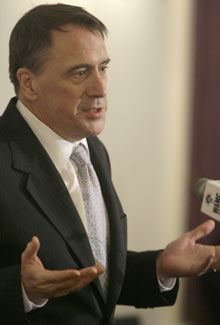Officials say Peter Galbraith removed from UN post after pressing for inquiry into results heavily favouring Karzai
The most senior American diplomat at the UN mission in Afghanistanappears to have been forced out of his post after failing to secure an investigation into claims of widespread fraud favouring Hamid Karzai in the August presidential elections.
According to UN officials speaking anonymously, Peter Galbraith, the deputy UN special envoy, is being removed from his post following a row with his Norwegian boss, Kai Eide, over the issue. Galbraith had taken an outspoken line towards the allegations of fraud in the 20 August election, in the process angering Karzai, the incumbent president.
 Peter Galbraith, the top American UN diplomat in Afghanistan, was apparently forced out after the country's ministers refused to work with him. Photograph: Toby Talbot/Associated Press
Peter Galbraith, the top American UN diplomat in Afghanistan, was apparently forced out after the country's ministers refused to work with him. Photograph: Toby Talbot/Associated PressGalbraith – responsible for electoral matters at the UN mission in Kabul – has already left the Afghan capital. UN officials previously acknowledged the dispute but attempted to play it down as a difference over "style".
Whether or not Galbraith returns in the short term, UN sources say the secretary general, Ban Ki-moon, was persuaded to end Galbraith's mission after ministers in Karzai's government apparently said they could no longer work with him.
Eide has confirmed that Galbraith left the country after an argument, but denied he asked the secretary general to remove him. In an email to the BBC, Galbraith denied he had been fired, but he is not expected to return to Kabul.
The recall of Galbraith would almost certainly have required the agreement of the Obama administration and has come as a surprise following the earlier demand by Obama's own envoy to Afghanistan, Richard Holbrooke, that Karzai respect the proper election process.
US criticism of the Karzai administration emerged in the leaked confidential report prepared by the US commander in the country, General Stanley McChrystal, which warned that corruption within the Karzai government was as big a threat as the Taliban.
The exit of Galbraith, a highly regarded diplomat who first came to prominence in the Balkans, would appear to further reduce Obama's scope for manoeuvre in Afghanistan at a time when he is facing calls from his military commander for up to 40,000 more soldiers. The delivery of such a prominent scalp for Karzai – if confirmed – would underline how little leverage the international community has over his regime, widely regarded by the international community as being part of the country's problem.
Perhaps significantly, Galbraith's reported removal comes within days of reports that the US and its allies decided to accept Karzai remaining as president even if the investigation into voter fraud meant his share of the vote falling below 50%, which had been expected to trigger a run-off with his closest rival, Abdullah Abdullah.
Galbraith was formerly the US ambassador to Croatia and helped negotiate the end of the war in that country. He served as director of political, constitutional and electoral affairs for the UN transitional administration in East Timor from 2000 to 2001. Outspoken in his criticism of the conduct of the US war in Iraq during the Bush administration, he resigned from government to write The End of Iraq: How American Incompetence Created a War Without End.
Within hours of the news that Galbraith was not expected to return to Kabul, a member of the UN's political affairs unit had resigned. Others are likely to follow among the diplomats who liked Galbraith personally and backed his tough approach to officials of the Afghan Independent Election Commission (IEC), who many believe are complicit in attempts to rubber-stamp a Karzai first round victory.
One UN source said the mood inside the mission was "far from happy" while another said the west appeared resigned to dealing with a tainted president.
Galbraith left Afghanistan shortly after a stormy meeting in mid-September attended by a large number of election monitoring organisations and other groups where he attacked IEC officials for not making preparations for a run-off.
A UN diplomat said Galbraith's strategy had been to try to compel the IEC to investigate the huge number of suspicious ballots before announcing preliminary results that put Karzai well over the 50% mark.
Galbraith was reported to have been furious that the IEC first voted to apply a set of fraud standards to its count that would have excluded tens of thousands of votes, only to reverse the decision the next day, apparently following political pressure.
His tough stance prompted Eide, once a close friend of Galbraith, to ask him to leave the country for a short period. Eide is far less confrontational and has adopted a cautious approach to navigating through the aftermath of an election now widely regarded as irreparably tainted.






















No comments:
Post a Comment